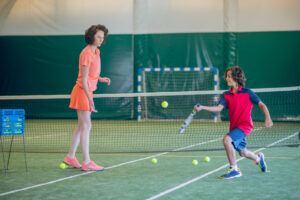Proper nutrition is important for tennis players to perform at their best on the tennis court, as it requires endurance, strength and agility. Tennis lessons Singapore offers experienced tennis coaches or sports dietitian who can assist you to guide through nutrition plans, understanding what to eat before and after practice can significantly improve your performance on the tennis court. Whether you’re a seasoned professional or a casual player, outlining meals and snacks to consume to ensure peak performance and muscle recovery is essential.
In this guide, we’ll discuss some tips related to nutrition for tennis players.
Pre-Practice Nutrition: Fuelling for Success
To maintain energy levels, you need to fuel your body with the right nutrients before hitting the tennis court, which will also provide support endurance throughout the session. The right nutrition plan helps tennis players stay energized and perform at their best, creating all the difference.

Key Guidelines for Pre-Practice Meals
1. Carbohydrates (Carbs)
In a high-intensity sport that requires bursts of speed and power, carbs are a critical source of energy for athletes. Before 1-3 hours of practice, players should consume easily digestible carbs like bananas, granola or smoothies with spinach, yogurt and a handful of oats will provide a quick energy boost without causing any discomfort.
2. Protein
Including protein in your pre-practice meal promotes muscle repair and growth. Pairing it with carbs with protein foods like eggs, yogurt, and whole grain toast with peanut butter can be an excellent choice which helps preserve lean muscle mass. Protein is essential for muscle growth, eating a small amount paired carbs and protein with a yogurt parfait or a smoothie with protein powder can protect muscles during intense activity.
3. Hydration
If you’re practicing in hot and humid conditions, staying hydrated is crucial for peak performance, aim to drink a sport drink with electrolytes. Plenty of water helps replace fluids lost in sweat. An hour before stepping on the tennis court, begin drinking water to prevent dehydration.
During Practice: Maintain Energy and Hydration
During practice, tennis players need to stay hydrated and continue fuelling their body to maintain energy levels throughout the whole session. Consider consuming a sport drink to replace electrolytes and provide extra carbohydrates if practice lasts longer than 60 minutes and perform at your best.
Tips for Mid-Practice Nutrition
- Players should hydrate themselves in every 15 minutes to prevent dehydration.
- For a quick source of energy, gulp down small amounts of a sports drink or eat energy bars or snacks like a banana.
Post-Practice Nutrition: Recovery and Replenishment
After an intense training session, to repair muscles, tennis players must focus on replenish glycogen stores, and rehydrate. Through balanced meals, which includes a mix of carbs, protein and healthy fats, prevent fatigue, maximize recovery and reduce the risk of injury in future practices or matches.
What to Eat After Practice?
1. Carbohydrates and Protein
After practice sessions, the body needs to restore the glycogen stores used for energy. Ensure you consume combination of carbs and protein like sweet potatoes, brown rice or a whole grain bread, which is easy to digest within 30 minutes of completion of practice is ideal for replenishing energy stores, and also aid in muscle recovery. Some easy to digest carbs like rice paired with protein-rich food such as chicken, fish or tofu is ideal for avoiding fatigue in your next session.
2. Healthy Fats
By including some healthy fats in your tennis nutrition, which supports overall muscle recovery, supports hormone regulation and inflammation control. Avoid foods high in fat immediately and prefer low in fat after your practice or tournament as they slow digestion and may cause discomfort, instead athletes should consume foods like avocado which is high in fat or fiber, nuts or olive oil to post-practice meals.
3. Protein for Muscle Repair
Tennis player’s diet should also include about 20-30 grams of protein which helps repair muscle fibers that may have been broken during tennis match, include foods like chicken, turkey or tofu and avoid processed foods.
4. Hydration
Water is crucial, needed to maintain hydration in the body which can be enhanced through adding electrolytes through sports drink which can further help to replace the sodium and potassium lost through sweat and improve your performance on the court. Whether you’re a beginner intermediate advanced player, rehydration will provide the best way to maintain your body temperature as well.
Long-Term Nutrition Tips for Tennis Players
Tennis players should also focus on their consistent balanced diet throughout the week to ensure sustained energy, fuel their bodies efficiently and reduces the risk of injury.
1. Balanced Meals
Tennis players should focus on a healthy diet which is a good mix of carbohydrates, protein and healthy fats which includes plenty of fuel vitamins and minerals. Fruits, vegetables, whole grains, nuts should be part of every tennis player diet which is an absolute energy source.
2. Avoid Processed Foods
Avoiding food that is high in sugar or fat helps in maintaining regular and lasting energy, which is needed to perform at your best during intense tennis matches or practices. Also avoiding foods that are high in fat or fiber and eating food with easily digestible carbs and light protein sources can help player with faster digestion.
3. Consult a Sports Dietitian
Consulting a sport dietitian is another great idea for a more personalized nutrition plan, as tennis is a sport which pushes you to maintain a healthy body. Design a diet tailored to your specific needs, training schedule and performance goals.
4. Replenish Energy After Matches or Tournaments
Consuming a mix of carbs and protein within 30 minutes to support rapid recovery, avoid snack or meal in order to maintain a healthy, after a long tennis match or tournament.

Conclusion
Both pre-practice and post-practice nutrition, includes eating carbs and protein before practice ensures sustained energy levels, along with hydration to maintain endurance. After practice, sports nutrition helps in muscle recovery and replenishing energy. For building and maintaining their performance tennis coach Singapore advises tennis players to consume more healthy fats, and protein.
In every tennis match, minimizing fatigue and reducing the risk of injury is achieved with a balanced diet and staying consistent with proper nutrition. By integrating these strategies, help your body to recovery nutrition, stay in top shape of every practice, match or tournament.





